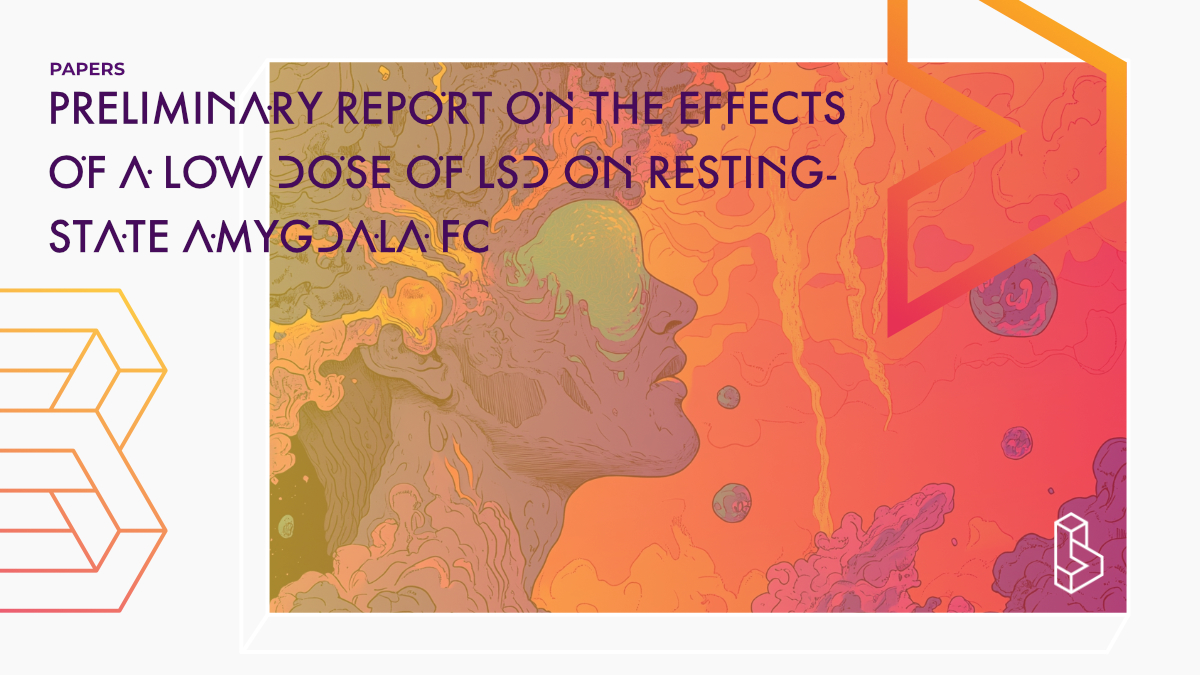In this double-blind, placebo-controlled study (n=20), a microdose of LSD (13µg) was found to increase and decrease connectivity in various areas of the brain. One of these effects correlated positively with mood increases, but overall mood changes were variable.
Abstract of Preliminary report on the effects of a low dose of LSD on resting-state amygdala functional connectivity
“Background: The practice of “microdosing,” or the use of repeated, very low doses of lysergic acid diethylamide (LSD) to improve mood or cognition, has received considerable public attention, but empirical studies are lacking. Controlled studies are needed to investigate both the therapeutic potential and the neurobiological underpinnings of this pharmacologic treatment.
Methods: The present study was designed to examine the effects of a single low dose of LSD (13 μg) versus placebo on resting-state functional connectivity and cerebral blood flow in healthy young adults. Twenty men and women, 18 to 35 years old, participated in 2 functional magnetic resonance imaging scanning sessions in which they received a placebo or LSD under double-blind conditions. During each session, the participants completed drug effect and mood questionnaires, and physiological measures were recorded. During the expected peak drug effect, they underwent resting-state blood oxygen level-dependent and arterial spin labelling scans. Cerebral blood flow, as well as amygdala and thalamic connectivity, were analyzed.
Results: LSD increased amygdala seed-based connectivity with the right angular gyrus, right middle frontal gyrus, and cerebellum and decreased amygdala connectivity with the left and right postcentral gyrus and the superior temporal gyrus. This low dose of LSD had weak and variable effects on mood, but its effects on positive mood were positively correlated with the increase in amygdala–middle frontal gyrus connectivity strength.
Conclusions: These preliminary findings show that a very low dose of LSD, which produces negligible subjective changes, alters brain connectivity in limbic circuits. Additional studies, especially with repeated dosing, will reveal whether these neural changes are related to the drug’s purported antidepressant effect.”
Authors: Anya K. Bershad, Katrin H. Preller, Royce Lee, Sarah Keedy, Jamie Wren-Jarvis, Michael P. Bremmer & Harriet de Wit
Notes on Preliminary report on the effects of a low dose of LSD on resting-state amygdala functional connectivity
This paper was included in a systematic review on microdosing psychedelics by Ona & Bouso (2020).
Summary of Preliminary report on the effects of a low dose of LSD on resting-state amygdala functional connectivity
Bershad and colleagues begin by discussing the prevalence of depressive disorders and the limitations of current antidepressant medications. They note that in recent years, there have been numerous anecdotal reports of therapeutic effects from very low doses of lysergic acid diethylamide (LSD), typically 10-15 micrograms taken once every 3-4 days. This practice, known as ‘microdosing’, has become widespread but has only recently become the subject of scientific investigation.
The researchers explain that LSD is a serotonin receptor agonist that acts primarily on 5-HT-2A/C receptors, and at higher doses, also affects dopamine systems. However, the receptor actions of very low doses of LSD are less well understood. Previous studies with higher doses of LSD have shown alterations in connectivity within cortico-striatal-thalamo-cortical feedback loops, which are implicated in the gating of sensory and sensorimotor information.
Find this paper
https://doi.org/10.1016/j.bpsc.2019.12.007
Open Access | Google Scholar | Backup | 🕊
Cite this paper (APA)
Bershad, A. K., Preller, K. H., Lee, R., Keedy, S., Wren-Jarvis, J., Bremmer, M. P., & de Wit, H. (2020). Preliminary report on the effects of a low dose of LSD on resting-state amygdala functional connectivity. Biological Psychiatry: Cognitive Neuroscience and Neuroimaging, 5(4), 461-467.
Study details
Compounds studied
LSD
Topics studied
Microdosing
Neuroscience
Study characteristics
Original Re-analysis
Placebo-Controlled
Double-Blind
Within-Subject
Randomized
Participants
20
Humans
Authors
Authors associated with this publication with profiles on Blossom
Harriet de WitHarriet de Wit is a Professor of Psychiatry and Behavioral Neuroscience at the University of Chicago. Her research focuses on the physiological, subjective (i.e., mood-altering), and behavioral effects of drugs in healthy human volunteers.
Institutes
Institutes associated with this publication
University of ChicagoResearch with psychedelics is taking place at the Human Behavioral Pharmacology Lab at the University of Chicago.
Linked Clinical Trial
Mood Effects of Serotonin AgonistsThe purpose of this study is to determine the effects of very low doses of serotonergic agonists on depressed mood in human volunteers.

